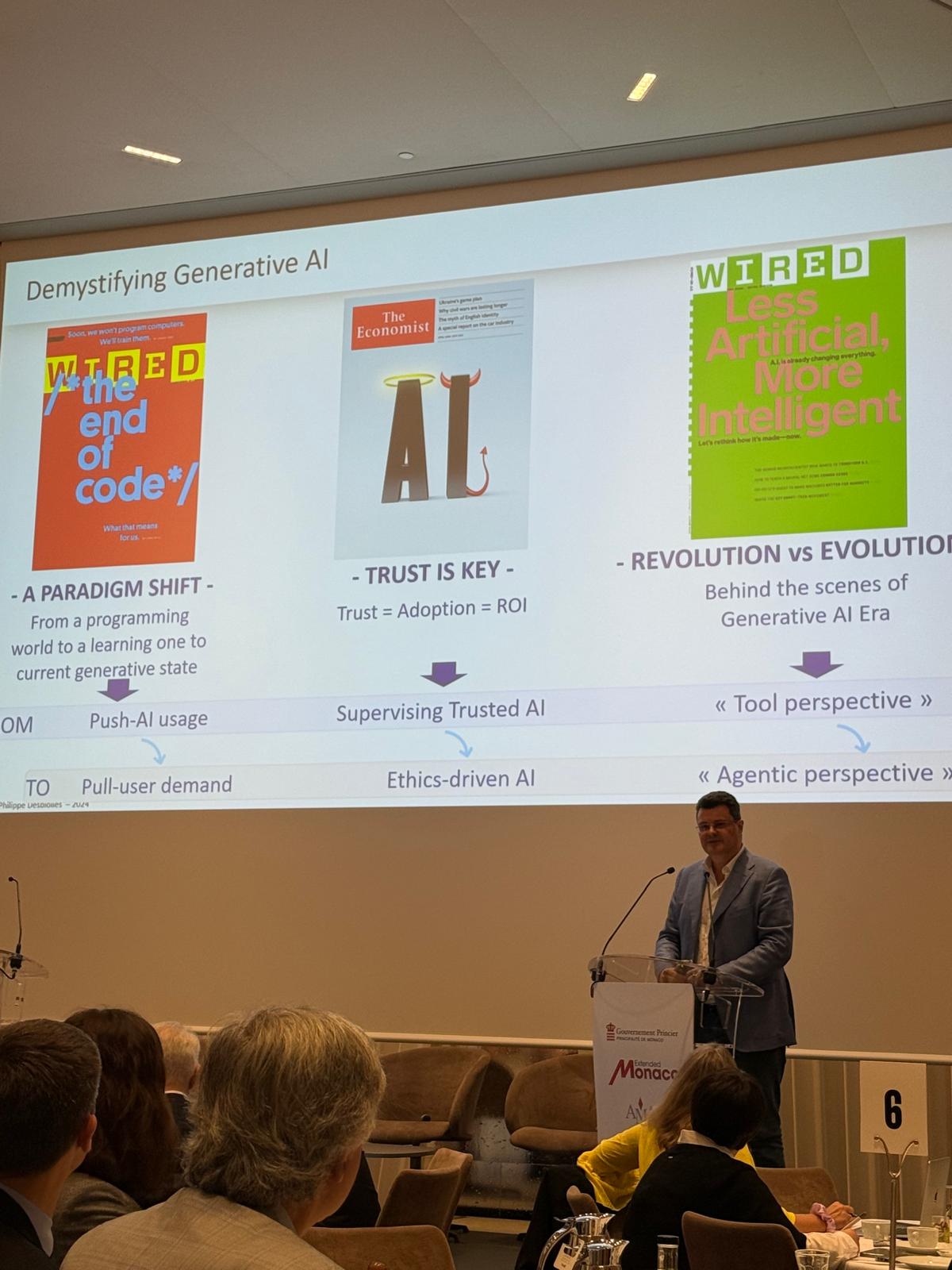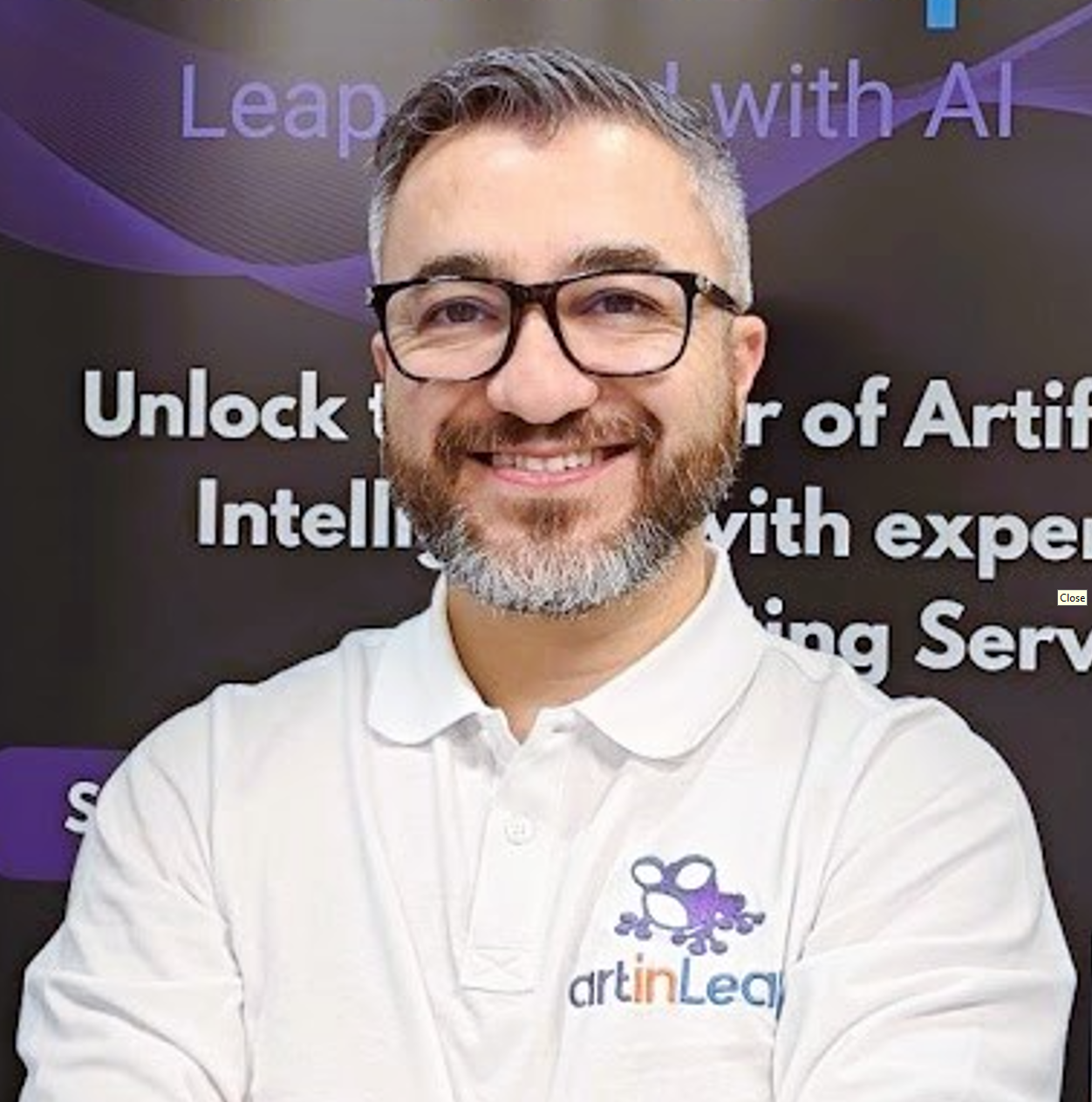On October 17, 2024, Monaco hosted the third edition of the Wealth Tech Summit, a flagship event focused on the theme “Artificial Intelligence and Investment: The New Frontiers of Finance.” Organized by the Princely Government of Monaco, Extended Monaco, and the Monegasque Association of Financial Activities (AMAF), this gathering brought together top experts from the finance and technology sectors.
Patricia Cressot, President of the Monaco Women In Finance Institute (MWFI), moderated the discussions throughout the conference.
The morning session began with a presentation by Robert Laure, President of the AMAF. He immersed the audience in the context of the financial sector’s accelerated digital transformation, highlighting the incredible adoption of artificial intelligence (AI) technologies. He referenced the meteoric rise of ChatGPT, which reached one million users by November 2022 and 100 million by January 2023, illustrating the speed of this revolution.
Robert Laure emphasized that the finance industry, which is heavily data-driven, is perfectly suited for AI integration. He showcased immediate applications such as process automation and customer service optimization via chatbots. He also discussed risk management with advanced anti-money laundering (KYC) tools, as well as credit management. In his view, generative AI amplifies these transformations, and its widespread adoption by financial institutions is inevitable.
Robert Laure also stressed the need for regulation to accompany this revolution. While acknowledging that AI enhances the financial sector’s efficiency and productivity, he warned that each new technology comes with its own set of risks. Among those mentioned, Laure focused on algorithmic biases, dependence on third-party providers, and cybersecurity threats. He emphasized the importance for financial institutions to manage these risks while seizing the opportunities offered by AI.
Jean-Philippe Desbiolles, Vice President of IBM for the banking and financial sector, shared a compelling vision of the impact of generative artificial intelligence (generative AI). He explored the multiple facets of AI in a rapidly evolving financial world. His presentation highlighted the current technological upheavals, the growth opportunities they present, and the ethical challenges they entail.
Generative AI: A World of Probabilities
Jean-Philippe Desbiolles began his speech by discussing the probabilistic nature of artificial intelligence. Unlike a deterministic vision, AI, he explained, never provides absolute certainty but rather results with a certain degree of fragility. As he pointed out, “We are machines of doubt,” and AI functions in a similar manner.
Desbiolles took care to remind the audience that despite the rapid advancements, maintaining a critical view is essential. He emphasized the importance of always combining machine learning with human intervention, highlighting that humans must remain at the center of decision-making. “AI should be a complement, not a replacement.”
An Industrial Revolution, Not Just an Evolution
For Desbiolles, generative AI is much more than a technological evolution. It represents an industrial revolution comparable to the invention of electricity or the birth of the internet. It is part of a larger combination of innovations, such as mobility, cloud computing, and big data processing.
However, he cautioned against the temptation to view everything through the lens of AI. While it plays a critical role, it is only one component of a broader revolution driven by multiple technological forces. AI, when linked to the power of the cloud and large datasets, is the foundation of this transformation, but it is essential to step back and understand the other factors shaping this revolution.
Generative AI: Successive Waves
AI continues to evolve and has passed through “successive waves” since 2010, starting with machine learning and then deep learning in 2015. Each advancement has allowed AI to push the boundaries of what it can accomplish. Today, with generative language models like GPT, adoption has accelerated at an unprecedented pace in the history of high tech.
This acceleration has overturned traditional patterns. Now, customers are demanding that companies provide AI solutions more quickly, whereas in the past, companies encouraged users to embrace new technologies.
This paradigm shift places financial sector players before a challenge: how to catch up with this wave while mastering it?
“Small is Beautiful”: Towards More Specialized AI
Desbiolles does not believe that “bigger is better.” On the contrary, he advocates for an approach where smaller, more context-specific AI models will replace the large, resource-intensive LLMs (Large Language Models). This shift towards a “multimodal” AI will increase the precision of the tools.
Algorithms dedicated to fields such as risk management, private banking, or asset management could allow for more precise oversight and control. Desbiolles added that the next major trends companies should focus on are “agentic” AI and quantum computing, which will open new perspectives for finance.
Agentic AI and Quantum Computing: The Next Frontiers
Agentic AI embodies a new era of automation where AI will no longer simply provide recommendations or summaries. Now, “intelligent agents” will execute concrete actions, in cooperation with other systems, to accomplish specific tasks. This approach will transform the functional and technical architectures of large organizations, forcing them to radically rethink their processes.
At the same time, quantum computing is gaining more prominence. While not yet fully mature, this technology is already being tested in specific use cases, such as predicting customer churn in financial services. Quantum Machine Learning (QML) is the next step in the revolution of massive, complex data processing capabilities.
Ethics and Regulation: Tomorrow’s Challenges
We now have the tools to measure criteria such as transparency, explainability, and robustness in AI systems. However, technology alone is not enough: companies must establish explicit ethical frameworks to ensure that AI is used fairly and in alignment with their values.
He stressed the need to formalize “ethical frameworks” within large corporations so that AI usage is not only controlled but also understandable to everyone, including customers. It must be measured through precise KPIs and continuously monitored; otherwise, the widespread adoption of these technologies risks undermining trust and transparency.
Human-Machine Collaboration
Desbiolles emphasized the importance of viewing AI as a true colleague with whom finance professionals will need to collaborate. Humans and machines must work hand in hand to meet the complex needs of clients.
He also warned of an increasing asymmetry, where users, equipped with ever more sophisticated AI tools, will be able to challenge financial institutions like never before. Advisors will need to redouble their efforts to remain relevant and credible in this new environment.
Local Perspectives: BNP Paribas’ Experience with AI
Charles Thurat shared his experience with AI implementation within BNP Paribas Wealth Management. He highlighted the unique challenges of using AI in wealth management, where data volumes are much lower than in retail banking, but client personalization requirements are much higher.
Thurat explained that BNP Paribas has long integrated AI tools into its consumer credit and retail banking processes. But in private banking, AI is used even more specifically for processes like KYC, which involves analyzing large amounts of structured and unstructured data. Teams can now filter this data more effectively to identify at-risk individuals and tailor their offers to clients’ precise needs.
This integration also allows BNP Paribas advisors to free up time, enabling them to focus more on human relationships, which are essential in wealth management. Thurat emphasized that AI should not replace commercial interactions but rather enrich them by providing more relevant information, faster.
AI and Cybersecurity
The Monegasque company MVE also had the opportunity to present its innovative approach to AI and cybersecurity. Mr. Oufrani explained how their company uses AI to secure financial transactions and protect clients’ sensitive information.
He discussed the growing challenges posed by interfaces such as ChatGPT, which can be exploited without sufficient protection. He stressed the importance of AI regulation, especially in vulnerable sectors like finance.
Simon Weinberger of Blackrock on AI’s Impact on Investment Strategies
Simon Weinberger from Blackrock addressed the impact of AI on investment strategies. Blackrock uses AI to analyze massive volumes of data, identify key indicators, and anticipate stock performance in the markets. By combining different sources, such as investor sentiment, hedge fund transactions, and trends on social networks, Blackrock employs machine learning to refine its forecasts and investment strategies.
Weinberger emphasized that recent improvements in computational power allow them to analyze years of data in seconds, making the process faster and more efficient.
The big question around AI is transparency: can we truly understand what the machine is doing?
Weinberger stated that the models produce intuitively understandable results.
AI does not replace human intervention but complements it, injecting creativity and meaning into data interpretation. This approach, based on integrating humans and AI, has helped Blackrock maintain consistent performance in financial markets, both in developed and emerging economies.
Combining these capabilities allows them to continue innovating and delivering strong results in an increasingly competitive environment.
Conclusion by Frédéric Genta on AI Geopolitical Analysis
In conclusion, Mr. Frédéric Genta from the Princely Government addressed the geopolitical analysis of artificial intelligence (AI). He outlined the four models based on geographical regions: the techno-liberal model dominant in the United States, the regulatory model favored by Europe, the agile model represented by regions like the Persian Gulf and Singapore, and finally, the planner model in China. Each approach is distinguished by its management of innovation, technological sovereignty, and regulatory control. Mr. Genta demonstrated how these models influence global economic and political dynamics, emphasizing the importance of international collaboration in AI.
The Wealth Tech Summit 2024 provided a comprehensive overview of the ongoing transformations in the financial sector, showing that while AI is promising, its adoption requires thoughtful and responsible integration. The finance of tomorrow will undoubtedly be smarter but also more complex, requiring close cooperation between humans and machines to fully harness its potential.











